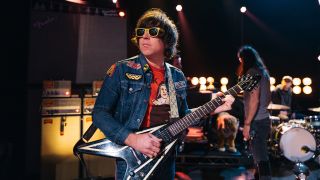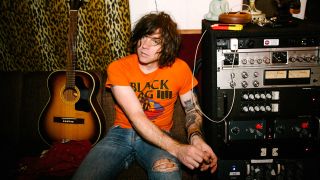Ryan Adams is no stranger to heartbreak. After all, his solo debut back in 2000, after leaving the critically acclaimed band Whiskeytown, was even titled Heartbreaker. On his sixteenth solo album, Prisoner, recorded as he split from his wife, singer-songwriter and actor Mandy Moore, Adams has again found inspiration in love and loss – and in some unexpected 80s rockers too.
Your new album, Prisoner, seems to have an interesting blend of influences, including ELO and AC/DC.
I listen to AC/DC. I don’t think it’s on this record, but the editing is. When it was time to edit the eighty songs down to eleven or twelve, I did my natural thing, which is to go for a run during the morning or early afternoon. And I sometimes listen to the AC/DC discography. I had an epiphany while I was running and some songs from Fly On The Wall came on. That’s a record I could always put on my run mix and I don’t have to leave any songs off. And I thought: “Man…”
It just dawned on me, finally, after months of trying to figure it out. By the time I got back I must have sounded like a lunatic, cos I was like: “I know exactly what to do!” And I could just look at the list of songs, and instantly the ones that mattered stood out to me; the ones that could make for a more identified piece.
You said eighty songs. Did you really write that many?
Yeah. I just recorded until I couldn’t any more. But there was at least sixty to eighty in consideration up to that point.
And it was all written on tour buses, in airports, in studios?
Well, I started on a tour bus, but then almost all of them were written in the studio, at Electric Lady. My manager always gives me two weeks off in between legs of the tour, and so I would fly from the last concert into New York. And then I would call my best friend Johnny, who plays drums. They’d have the studio set up, and it’d just be me and him, and we’d record that night and then all those two weeks.
Most of the songs seem to have been influenced by Bruce Springsteen’s Nebraska and various albums by The Smiths.
They were huge, crucial influences of mine. I listened to a lot of [Springsteen’s] Darkness On The Edge Of Town when I was just about to be separated. I would listen to Don Henley. I was listening to a lot of Bruce Hornsby And The Range.
I think The Smiths were a perfect band. All of their music was done in five years. Johnny Marr was eighteen, and the band was broken up when he was twenty-three. What an unbelievable thing for anyone to do at any time of their life. They were making music that has fundamentally changed everything.
Is Johnny Marr somebody you’d like to work with in the future?
I respect him so much and always have, and I always cite him as an influence, and his playing and his writing have been huge for me. I got to hang out with him recently at Fuji Rock and he was such an unbelievable, gracious gentleman. I invite Johnny Marr to play on every record I make. He always has something else going on!
Talking of working with other people, at the moment you’re producing Liz Phair’s comeback album. She hasn’t done anything in ages. What are the songs like?
This will blow everyone’s mind. It’s very much like the album you would have expected to follow Exile In Guyville. And it’s connected to it in a way that I can’t say yet. But people will be very shocked to find out.
Is the Whiskeytown reunion happening?
No. That was something that was taken out of context. Someone once asked me: “Would you guys ever get back together?” And I said: “It’s not likely, and I don’t believe it will ever happen.” But I was like: “But it would be foolish to say that we would never actually be in the same room and ever not play instruments together.” And that got turned into: “We are getting back together.” But that’s the way news works now.
We live in the age of soundbites.
Yeah. But I don’t want to filter myself, because the interview matters, and I figure I’ll suffer the soundbite to make sure I give a more thorough interview. I always make sure to not give a soundbite if someone is fishing for one.

The new album’s artwork is a painting that used to be in your old house, and is one of the last things you took out of it.
Yes. It’s now at Johnny Depp’s home. He has four of my pieces of work. This and another painting were about to be thrown away, and two of my other paintings I had already gifted him because he loves to collect art and he himself loves art, and he’s a good friend. He loves life. Loves thinking. And books.
There’s a beautiful box set of Prisoner coming out, in the shape of twelve singles with unreleased B-sides, and with gimmicks such as a miniature stage with real lights. That all sounds very Kiss.
I’m a collector geek. I love that stuff. I love Kiss. There are things hidden inside. There’s not just things inside of the record, there are hidden codes and things that, if you figure out what they are, lead to things outside of it. All of my years of being interested in Dungeons & Dragons and collectible eighties culture and nerdom have gone into the making of this thing!
With the lyrics on the new record, you’re very open about all the pain you’ve experienced during your divorce.
There’s always a very personal message, a very human message. From Henry Miller to Jack Kerouac to Agnes Martin, even Robert Rauschenberg, there’s always so much humanity at play. I think those things, the records I love, the guitar players, even the philosophers or the lecturers or the scientists or all these people that I really admire, are people who are just kind of… unconscious of the construct that they think. They don’t want to make a construct for you to try to decipher. You know what I mean?
You’re an old-school storyteller, aren’t you?
Well, I could’ve been like… I knew I would have trouble with my name even as early as I did, and I didn’t change it. I knew I was being very open when I struggled with drinking. But the idea of self-editing seems so stupid to me, because Elvis didn’t, Dylan didn’t, Neil Young didn’t, Henry Miller didn’t. You know? None of these people that I admire did. And I’m not saying I’m like any of them or even remotely ever going to equal what they are, but I could fucking try. And to me, the way to try is to not try; is to not pretend to be something I’m not.
I mean, I still filter things through the romantic filter, the romantic lens of my art, so I don’t tell people straight out. I don’t have a song that goes: ‘I’m getting divorced, what the fuck, I’m about to lose millions of dollars, I’m getting divorced.’ I should write that fucking song – it would probably be very popular! But I don’t. Instead it’s not how I perceive the reality that I’m in. Instead I see this other thing. I see this romantic thing.
Prisoner is really more about the fact that on the other side of the negative experience there’s a really wonderful experience. I made the record having a great time. All my records have dealt with these heavy, personal topics. But there’s a sensuality in this record. There’s hope in the music. And even though I talk about things like being isolated, and the haunted house with the memories of the past, or all these different subjects, it’s palpable and it’s there. I’m being illuminated by something, and I’m being attracted to my way through it.
Prisoner is available now on Virgin EMI.

